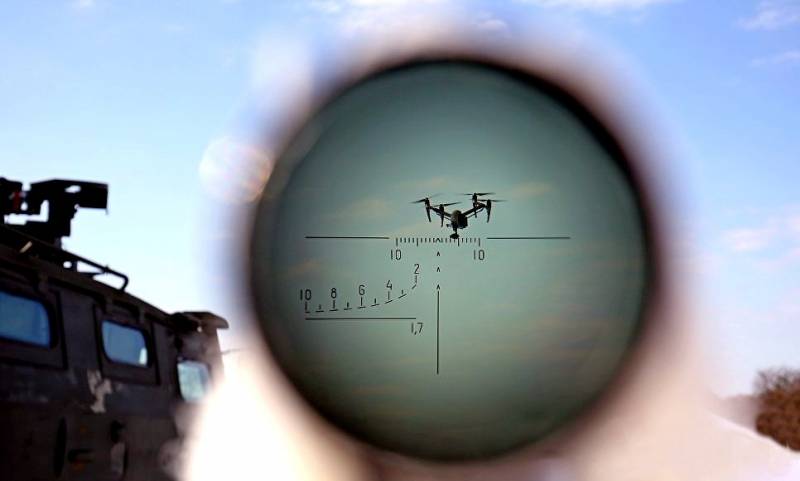The Ministry of Defense will defend the 2018 World Cup complexes "Resident" and "Light"
From June 14 to mid-July 2018, Russia will host a large-scale sporting event - the World Cup. According to experts, up to a million football fans from around the world can come to our country as fans. The greatest interest in purchasing tickets for sports matches in Russia is shown by residents of Europe and Latin America.
The responsibility of the Russian Federation, as a host, is to ensure the safety of the 2018 World Cup. In recent years, the threat of terrorist acts by extremist organizations and single criminals has grown around the world. In addition to attacks on the ground, the danger from terrorists can come from the air. The market for unmanned aerial vehicles is actively developing. There are cases when militants of the ISIS group banned in Russia artificially turned peaceful drones into strike machines and launched effective air strikes against their opponents in Iraq.
The problem of enemy drones was also encountered by the Russian military in Syria. On New Year's Eve 2018, as a result of an attack on a military base in Khmeimim, where parts of the Russian Air Force are deployed, an ammunition depot was blown up, several Russian planes and helicopters were damaged, and two people were killed. Although the Ministry of Defense denies the attack by drones, according to some reports, it was still drones that were used. On the night of January 6, 13 enemy drones attacked the Russian military in Khmeimim and Tartus, 7 were shot down by air defense forces, the rest were taken under control.
The bitter experience of the Syrian campaign can be used by the Russian military and special services to ensure the safety of mass events in Russia itself. FSB veteran Alexei Filatov warns:
The Ministry of Defense of the Russian Federation will allocate for the protection of Russian guests in all 11 cities where football matches will be held, both combat complexes tested in the Syrian desert and experimental novelties. In the capital, the sky will be guarded by two complexes "Silok" and "Svet-KU", in the northern capital and Yekaterinburg - "Svet-KU" and the mobile groups EW R-300R "Resident" and R-934BMV Sinitsa.
Svet-KU is designed to protect against the interception of information transmitted wirelessly. R-330R "Resident" carries out electronic reconnaissance and suppression. Sinitsa suppresses tactical aviation guidance systems, ground-based radio communications and VHF radio communications.
The Federal Security Service will provide 60 “Crossbows”, portable complexes for suppressing short-range communication channels, to suppress the penetration of drones into the protected area. An unpleasant surprise for attackers may be the news of the special services - the Orel-ChMF and PZ1076 complexes, whose characteristics are unknown.
The responsibility of the Russian Federation, as a host, is to ensure the safety of the 2018 World Cup. In recent years, the threat of terrorist acts by extremist organizations and single criminals has grown around the world. In addition to attacks on the ground, the danger from terrorists can come from the air. The market for unmanned aerial vehicles is actively developing. There are cases when militants of the ISIS group banned in Russia artificially turned peaceful drones into strike machines and launched effective air strikes against their opponents in Iraq.
The problem of enemy drones was also encountered by the Russian military in Syria. On New Year's Eve 2018, as a result of an attack on a military base in Khmeimim, where parts of the Russian Air Force are deployed, an ammunition depot was blown up, several Russian planes and helicopters were damaged, and two people were killed. Although the Ministry of Defense denies the attack by drones, according to some reports, it was still drones that were used. On the night of January 6, 13 enemy drones attacked the Russian military in Khmeimim and Tartus, 7 were shot down by air defense forces, the rest were taken under control.
The bitter experience of the Syrian campaign can be used by the Russian military and special services to ensure the safety of mass events in Russia itself. FSB veteran Alexei Filatov warns:
An UAV is an effective way to deliver exactly to the target, plant 2-3 kg of TNT on a patch and blow it up
The Ministry of Defense of the Russian Federation will allocate for the protection of Russian guests in all 11 cities where football matches will be held, both combat complexes tested in the Syrian desert and experimental novelties. In the capital, the sky will be guarded by two complexes "Silok" and "Svet-KU", in the northern capital and Yekaterinburg - "Svet-KU" and the mobile groups EW R-300R "Resident" and R-934BMV Sinitsa.
Svet-KU is designed to protect against the interception of information transmitted wirelessly. R-330R "Resident" carries out electronic reconnaissance and suppression. Sinitsa suppresses tactical aviation guidance systems, ground-based radio communications and VHF radio communications.
The Federal Security Service will provide 60 “Crossbows”, portable complexes for suppressing short-range communication channels, to suppress the penetration of drones into the protected area. An unpleasant surprise for attackers may be the news of the special services - the Orel-ChMF and PZ1076 complexes, whose characteristics are unknown.

Information